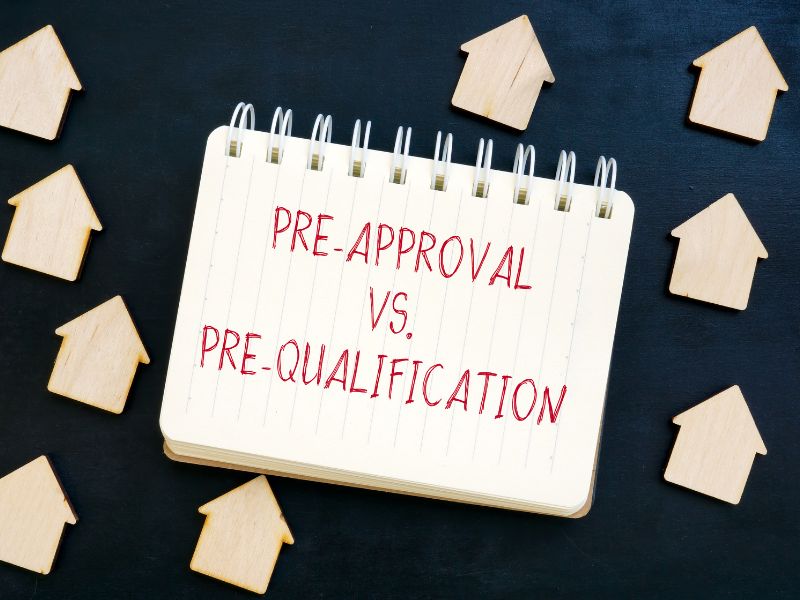 Pre-approval and pre-qualification are terms commonly used in the context of mortgage loans, but they can also apply to other types of loans. While they sound similar, they have different meanings and implications in the loan application process:
Pre-approval and pre-qualification are terms commonly used in the context of mortgage loans, but they can also apply to other types of loans. While they sound similar, they have different meanings and implications in the loan application process:
-
Pre-qualification:
- Definition: Pre-qualification is a preliminary assessment of a borrower’s financial situation based on information provided by the borrower. It does not involve a thorough analysis of the borrower’s credit report or an in-depth look at their ability to borrow.
- Process: To get pre-qualified, a borrower typically provides information such as income, debt, and assets to a lender or uses an online tool. The lender uses this information to give the borrower an estimate of the mortgage amount they may qualify for.
- Reliability: Pre-qualification is a less formal process and is not a commitment from the lender. It’s more of an estimate or a starting point for a home search.
-
Pre-approval:
- Definition: Pre-approval is a more formal process where a lender thoroughly evaluates a borrower’s financial background, including a detailed examination of their credit report. The lender issues a conditional commitment to lend a specific amount, contingent on the property appraisal and other conditions.
- Process: To get pre-approved, a borrower typically completes a mortgage application and provides necessary documentation, such as pay stubs, W-2 forms, bank statements, and consent for a credit check.
- Reliability: Pre-approval is a stronger indication of a borrower’s ability to secure a loan. It demonstrates to sellers that the borrower is a serious and qualified buyer.
In summary, pre-qualification is a preliminary assessment based on information provided by the borrower, while pre-approval involves a more comprehensive analysis, including a credit check. Pre-approval is generally more reliable and holds more weight in a real estate transaction. Keep in mind that the specific processes and requirements can vary among lenders.
 This will be another light week before the next large releases of the CPI and PPI data. The overall unemployment numbers have been trending lower which will likely leave the Federal Reserve board in a state of suspension. They have made many assertive statements they do not intend to cut rates soon, but the signs of a soft landing for the economy are numerous, leading to much speculation about impending rate cuts. As a general indicator, lending partners have seen a near 6 week-to-week decline in lending rates. The largest data releases this week are the U.S. Unemployment Reports and Non-Farm Payroll data releases.
This will be another light week before the next large releases of the CPI and PPI data. The overall unemployment numbers have been trending lower which will likely leave the Federal Reserve board in a state of suspension. They have made many assertive statements they do not intend to cut rates soon, but the signs of a soft landing for the economy are numerous, leading to much speculation about impending rate cuts. As a general indicator, lending partners have seen a near 6 week-to-week decline in lending rates. The largest data releases this week are the U.S. Unemployment Reports and Non-Farm Payroll data releases. The contemporary trend towards expansive dimensions is palpable in various aspects of modern life. Oversized soft drinks, large fast-food meals, and expansive smartphones have become ubiquitous. However, one unlikely sector experiencing a similar trend is the realm of mortgages.
The contemporary trend towards expansive dimensions is palpable in various aspects of modern life. Oversized soft drinks, large fast-food meals, and expansive smartphones have become ubiquitous. However, one unlikely sector experiencing a similar trend is the realm of mortgages. Those who are involved in the real estate industry likely know that mortgage rates are at an all-time low. At the same time, nobody wants to pay more for a house than they have to. Some of the most important factors that dictate how much someone is going to pay for a house include points and interest rates.
Those who are involved in the real estate industry likely know that mortgage rates are at an all-time low. At the same time, nobody wants to pay more for a house than they have to. Some of the most important factors that dictate how much someone is going to pay for a house include points and interest rates. It’s easy to get Private Mortgage Insurance (PMI) confused with homeowners’ insurance, but PMI is an entirely different thing that may or may not be necessary when it comes to your home purchase. If you’re going to be investing in a home in the near future and are wondering what PMI may mean for you, here are some things to consider regarding this type of insurance.
It’s easy to get Private Mortgage Insurance (PMI) confused with homeowners’ insurance, but PMI is an entirely different thing that may or may not be necessary when it comes to your home purchase. If you’re going to be investing in a home in the near future and are wondering what PMI may mean for you, here are some things to consider regarding this type of insurance. There are lots of people who have heard that one of the top ways to ensure the best mortgage rate possible is to refinance. At the same time, it is critical to make sure that this process is planned out accordingly.
There are lots of people who have heard that one of the top ways to ensure the best mortgage rate possible is to refinance. At the same time, it is critical to make sure that this process is planned out accordingly. The first week of December’s largest reports are the GDP estimates, which will be the second estimations of the year prior to the final release. The final GDP reports will be after the new year and
The first week of December’s largest reports are the GDP estimates, which will be the second estimations of the year prior to the final release. The final GDP reports will be after the new year and Embarking on a construction project entails countless challenges, and managing the associated budget is a crucial task. A well-planned and meticulously monitored budget ensures the project’s success without financial hiccups. Here’s a comprehensive guide on effectively managing a construction loan budget.
Embarking on a construction project entails countless challenges, and managing the associated budget is a crucial task. A well-planned and meticulously monitored budget ensures the project’s success without financial hiccups. Here’s a comprehensive guide on effectively managing a construction loan budget. Buying a home is one of life’s significant milestones, but it often comes with a significant price tag. Fortunately, the sticker price on a house isn’t always set in stone. When buying a home, negotiating certain costs can save you a significant amount of money. Here are some costs that every homebuyer should negotiate:
Buying a home is one of life’s significant milestones, but it often comes with a significant price tag. Fortunately, the sticker price on a house isn’t always set in stone. When buying a home, negotiating certain costs can save you a significant amount of money. Here are some costs that every homebuyer should negotiate: When it comes to home improvements, many homeowners are opting for the do-it-yourself (DIY) approach. DIY home improvements not only allow you to save money but also provide a sense of accomplishment and personalization. Whether you’re fixing a leaky faucet or renovating an entire room, taking on home improvement projects can have numerous benefits that extend beyond physical transformation.
When it comes to home improvements, many homeowners are opting for the do-it-yourself (DIY) approach. DIY home improvements not only allow you to save money but also provide a sense of accomplishment and personalization. Whether you’re fixing a leaky faucet or renovating an entire room, taking on home improvement projects can have numerous benefits that extend beyond physical transformation.